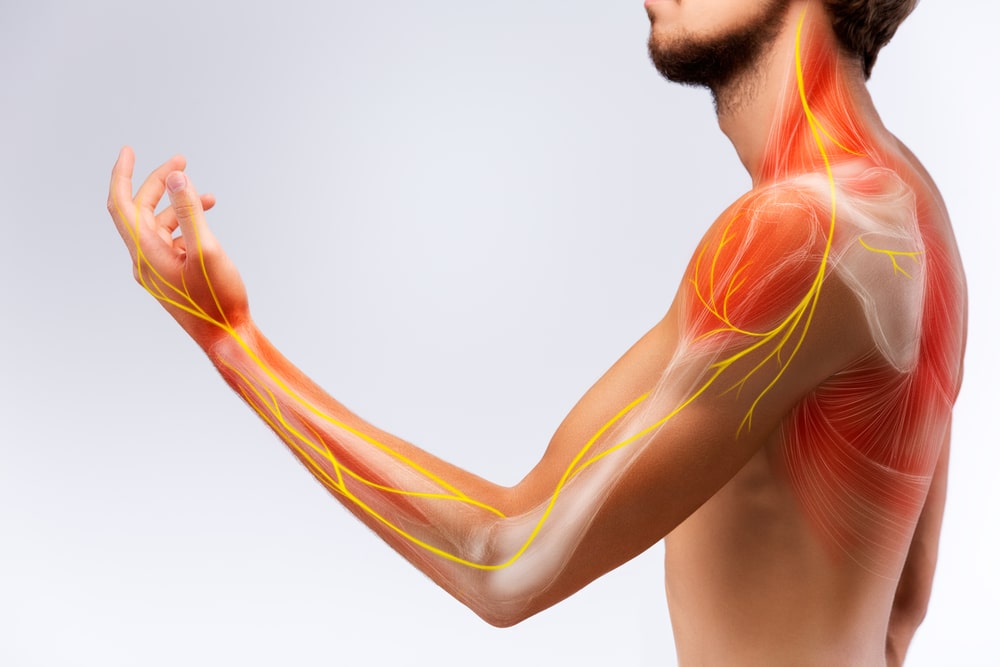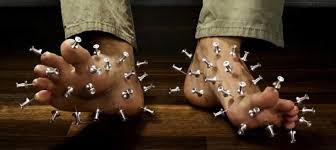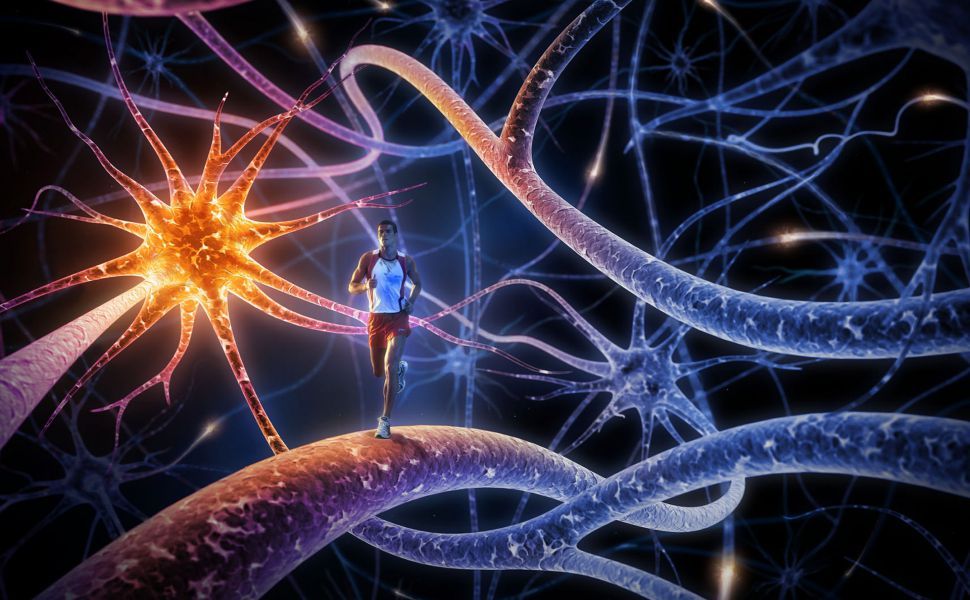NERVE PAIN
Nerve pain referred to as neuralgia or neuropathic pain is caused due to a health condition affecting the nerves that carry the sensation to the brain.
Nervous System controls every motion of the body; voluntary and involuntary actions like regulating the breathing to control muscle contractions and sensing heat and cold.
Our body has 3 types of nerves:
- Automatic Nerves – These control the involuntary and partially voluntary activities of the body which include the heart rate, blood pressure, temperature regulation and digestion.
- Motor Nerves – These help control the movements as well as actions by passing information from the brain and spinal cord to the muscles.
- Sensory Nerves – These nerves carry information from the skin and muscles and send it back to the spinal cord and brain. The information sent to the brain is processed to let the affected area feel pain along with other sensations.

CAUSE OF NERVE PAIN
Nerve pain begins from various causes which includes diabetes, infections (like shingles), multiple sclerosis, and effects of chemotherapy or trauma. The neuropathic pain is based on disease, injury, infection, and loss of limb.
- Disease – Medical conditions like multiple sclerosis, diabetes, multiple myeloma, and other types of cancer can trigger the nerve pain. Alcohol abuse causes chronic neuropathic pain. The medical condition can trigger trigeminal neuralgia which is a painful condition causing severe neuropathic pain usually on one side of the face. Chemotherapy and radiation also impact the nervous system causing unusual pain signals to the brain.
- Injuries – The injury caused would damage the tissue, muscles or joints causing the damage to the nerve bunch. The nerve damage would be for a long time even after the healing of the injury. Accident or injuries can cause Herniated discs and spinal cord compression causing the damage to the nerve fibers present around your spine
- Infection – Viral or bacterial infection like shingles, syphilis etc. could cause the burning, stinging unexplained pain of the nerves.
- Limb Loss – Phantom limb syndrome, an uncommon neuropathic occurs due to amputation of leg or arm. The brain would still receive pain signals from the limb even after it is amputated.
It can also be caused due to vitamin deficiency like vitamin B, carpal tunnel syndrome, thyroid problems, facial nerve problems and arthritis in the spine.
SYMPTOMS OF NERVE PAIN
The nerve pain is described as a shooting, stabbing or burning sensation that is caused like a sudden and sharp electric shock. People suffering from nerve pain are usually sensitive to temperature both hot and cold. The pain usually worsens at night ranging from mild to severe.
Other symptoms for nerve pain are:
- Tingling and numbness in the affected area like pins and needles feeling
- Pain occurs spontaneously or occurring without a trigger
- Pain caused in daily activities like rubbing against something, being in cold temperatures, or brushing your hair
- Emotional problems are triggered due to chronic pain like loss of sleep, fatigue, anxiety or depression
- Muscle atrophy
- Might even lead to paralysis
DIAGNOSIS OF NERVE PAIN
The doctors would examine and observe the symptoms to test your nerves by testing the strength of your muscles, checking your reflexes, and sensitivity to touch.
Doctors would get the blood tests done to look for underlying conditions, nerve conductions are studied to measure nerve conductivity for electrical signals and CT scan or an MRI scan to measure the pressure on the nerve.

TREATMENT OF NERVE PAIN
MEDICAL TREATMENT –
Doctors would prescribe medicines that are aimed to minimize the nerve pain you are suffering.
- Painkiller –Over-the-counter (OTC) painkillers are used to relieve the nerve pain by numbing the area and reducing the signals being sent to the brain. The components of the painkiller might include nonsteroidal anti-inflammatory drugs (NSAIDs) or acetaminophen that reduces pain and inflammation. Painkillers help in calming the pain and the dosage would depend on the severity of the pain. Mild pain can be controlled by OTC medicine however stronger painkillers like opioids are used for severe pain.
- Anti-epileptics – These would interfere in the pain signals and stop faulty signal transmissions to the brain. Commonly used anticonvulsant are gabapentin and pregabalin
- Antidepressants – These help in treating other symptoms like anxiety and depression along with relieving the pain of the nerve. Commonly used medicines are tricyclic or serotonin-norepinephrine reuptake inhibitors.
- Capsaicin Cream – The tropical cream is derived from pepper. These help in reducing the level of Substance P which is a neuro-transmitter that is associated with inflammation and pain.
- Lidocaine patch – These help in reducing the burning, stabbing pain, or aches as well as inhibiting the nerves from sending pain signals to the brain. These provide quick relief in conditions like post-herpetic neuralgia.
- Nerve Blocks – These provide interruption of pain related signals travelling along the affected nerve. It also helps in reducing inflammation. They are available in the form of surgical treatments like steroid injection and local anesthetics or in the form of painkillers.
- Implanted Device – Spinal cord Stimulator (SCS) is placed under the skin which sends mild electric current to your spinal cord, brain and nerves. These impulses would prevent the irregular signals being sent to the brain and control nerve pain as well as other symptoms.
- Transcutaneous electrical Nerve Stimulation (TENS) – These also block the transmission of pain signals to your brain, spinal cord or nerve. Low-voltage electric currents are provided using a small battery operated device. Natural pain mechanism of the body is activated through these electric signals.

NON-MEDICINE TREATMENT –
Pain management requires a combination of both medical as well as non-medical procedures to provide maximum benefit to you. Some people might respond to these non-medical treatments better than medical treatments.
- Acupuncture – This is used since ancient times to treat nerve pain and relieve the discomfort. The needles are inserted into the pressure points to stimulate the nervous system. This would release the endorphins (your natural painkiller) into the muscles, spine and brain to relieve pain.
- Neurofeedback – This is a type of biofeedback helping in treatment of nerve pain. This uses real-time display of brain activity using electroencephalography (EEG). With the help of brain activity details signals are sent to affected areas using light and sound that helps in release of endorphins to reduce pain.
- Dietary changes – Nerve pain is caused by medical conditions like diabetes or deficiency of vitamins and minerals like vitamin B deficiency. Dietary supplements help in fulfilling the body’s requirement of these nutrients as well as control body parameters like sugar level, blood pressure etc. helping in reduction of nerve pain.
Multimodal therapy is an effective way of managing the nerve pain using a combination of medications, physical therapy, psychological treatment, surgery (if required) or implants.
OUTLOOK
Neuropathic pain impacts your life negatively. It is important to take steps to treat it and prevent worsening symptoms. If not treated this could lead to serious disabilities like insomnia, anxiety, depression and more.
If you or anyone you know is suffering from nerve pain, our expert providers at Specialty Care Clinics will take care of your health and help you recover.
Call us on 469-545-9983 to book an appointment with Dr. Rao Kamran Ali.
